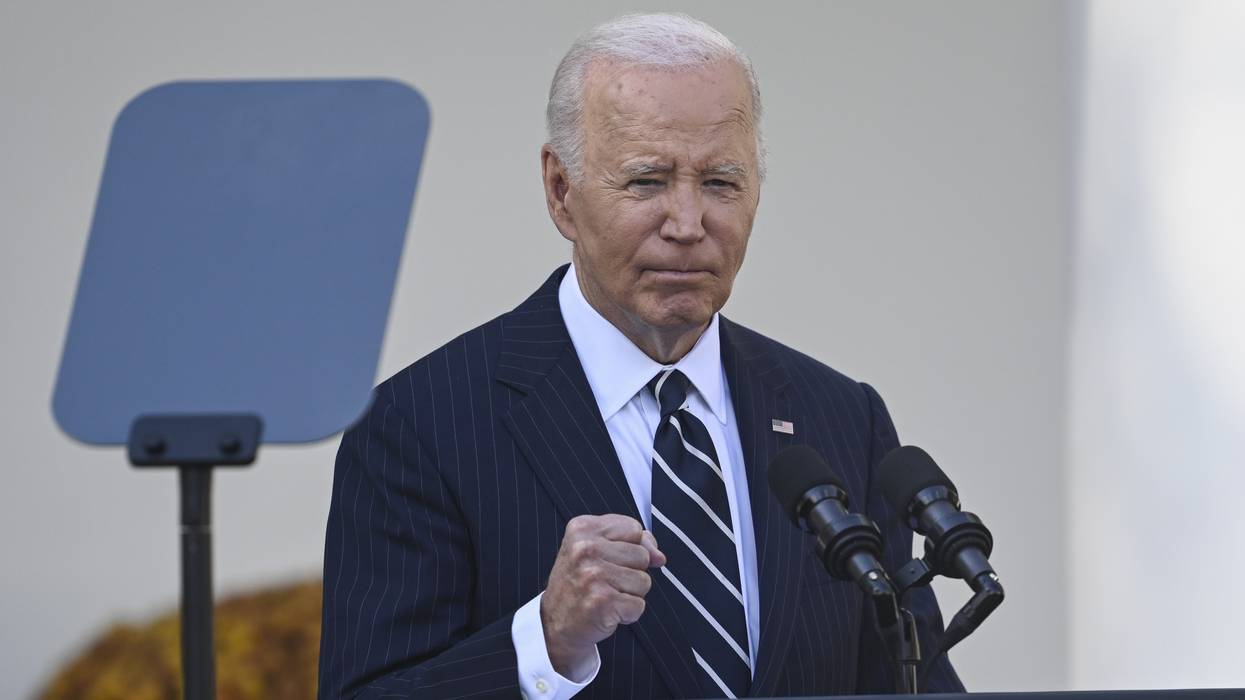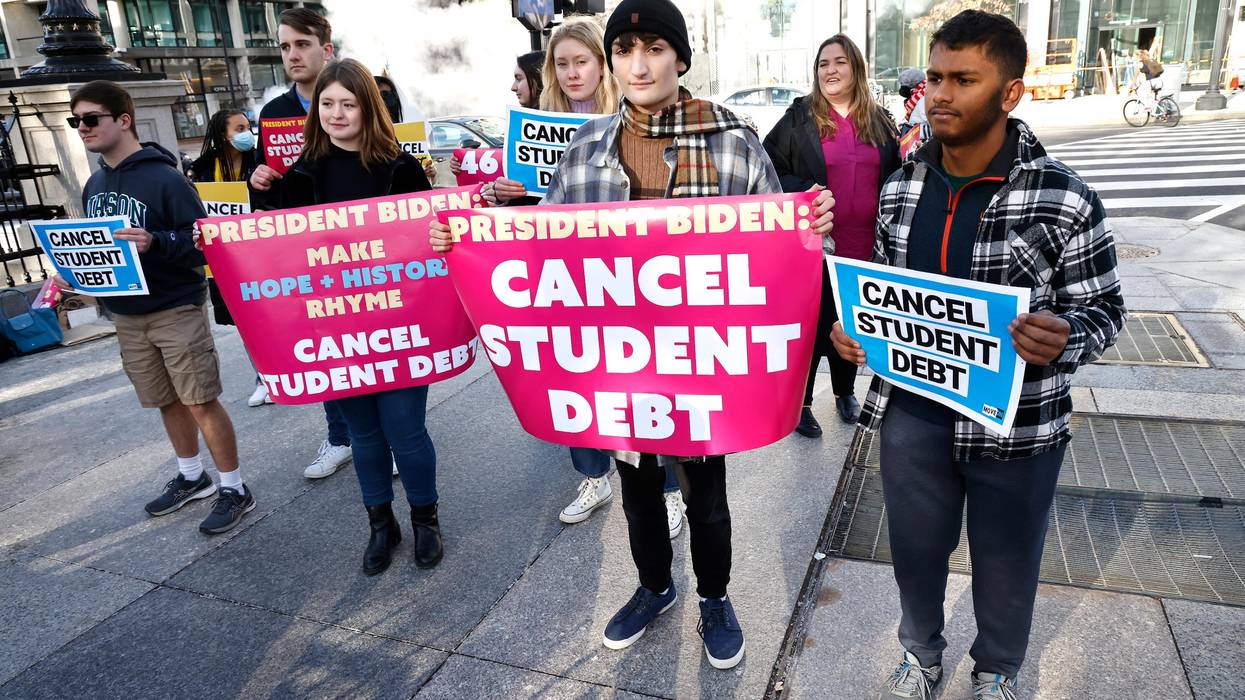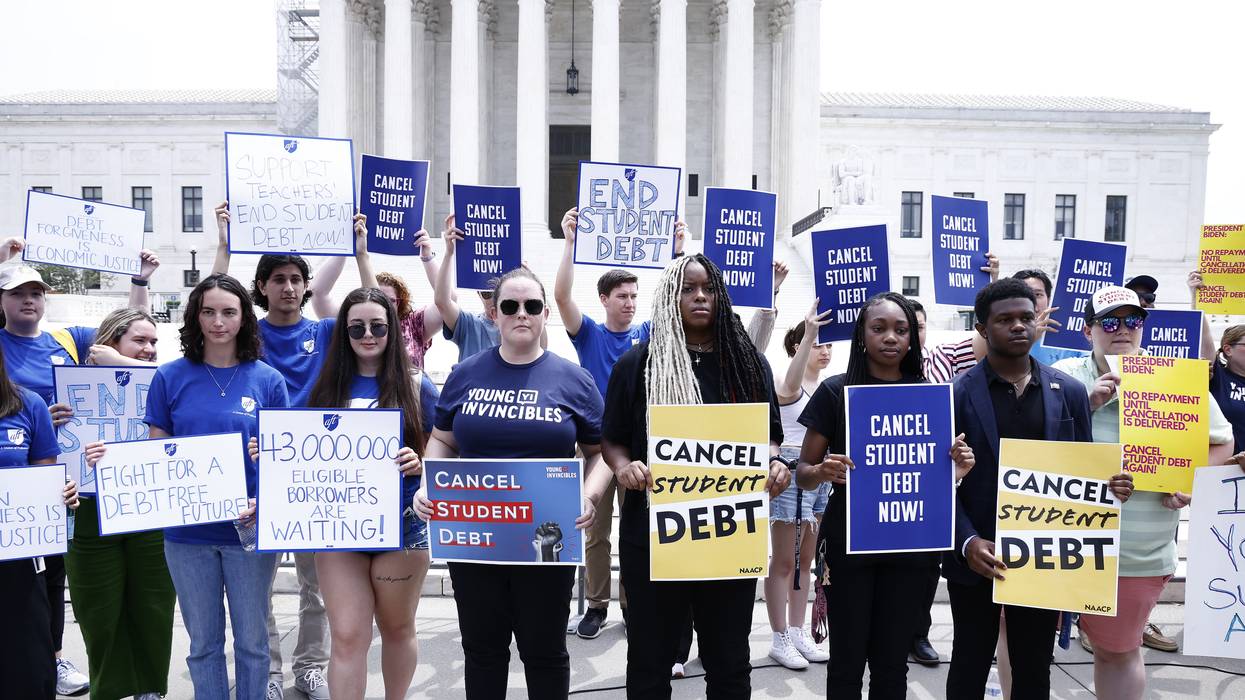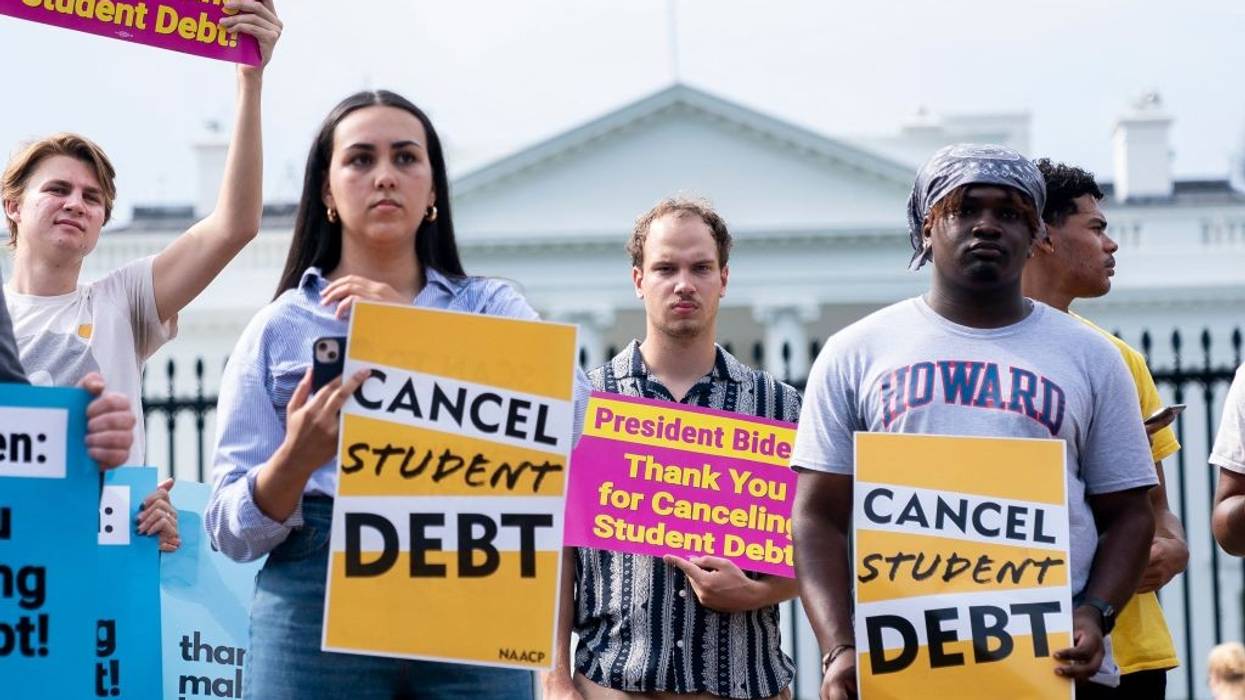Hey Democrats, Tell Biden to Break Something for Democracy!
For anyone who's invested in the Democratic Party, there is absolutely zero excuse at this point not to be actively demanding governance from the Biden administration that creates roadblocks to Trumpism.
We are awash in post-electoral grand explanatory arguments and pre-Trump injunctions to organize. This is neither. I want to talk now about breaking things.
As former president of a wall-to-wall union local and author of a book on how regular people can respond to the polycrisis, I'm committed to local organizing and delighted to see so many calls for it (though as a leftist I'd gently remind everyone that we equally need translocal solidarities to reorient the worst of what's to come). But, I'm also frustrated by these calls. They gloss over a crucial site of immediate political action within the actually existing system of U.S. governance.
For anyone who's invested in the Democratic Party, there is absolutely zero excuse at this point not to be very, very, very actively demanding governance from the Biden administration that creates roadblocks to Trumpism.
There's a lot of talk about what a Trump administration will mean and how to resist the worst of that locally and at a grassroots level. And that's great. But RIGHT NOW, literally at this exact moment and for a couple more months, your guy is still in office.
Wither the Last 60 Days of Biden's Presidency?
One of the dominant rhetorical tropes of American presidential politics is that of The First 100 Days. (This goes back especially to FDR, and refers to massive collections of reorienting legislation and executive orders.) And one of the major political developments of the last few decades (or century-and-a-half) in the U.S. is the rise of an "executive presidency" or "unitary executive," the refashioning of the executive branch of American government as a fundamentally presidentially controlled domain of quasi-legislative action that sidesteps the legislative branch. That includes governance by executive order and direct presidential control of the various agencies that implement and administer the legal order.
This is widely regarded as a threat to constitutionalism and democracy, and rightly so. It's also, however, how things have shaken out for us here in the United States. It's the system that we have, and the collection of rhetorical tropes and real presidential powers that orient our collective conversation now about how an incoming President Donald Trump will be enabled to behave in authoritarian ways.
It makes sense that everybody's worried about that.
If you are a person who wants to believe in this system that we have, you can today right now take the pragmatic approach of demanding something immediate from your political party that you believe is invested in democracy and that is, again, actually in control of the executive branch.
But wouldn't a better use of energy for rank-and-file Democrats, for those who believe ( against the evidence) that their preferred political party cares about small-d democracy, be to demand from U.S. President Joe Biden a "Last 60 Days" devoted to antifascist executive action?
Where, right now, are the calls for an unprecedented barrage of executive orders that would interfere with all that you take (and I agree) to be worst in Trumpism?
If you believe that one political party in the existing U.S. system of governance exists to defend and promote small-d democracy and human rights and equality and all the rest, why are you not right now demanding that this party use the extremely well-understood, very practically real power that it presently has to do things that will dramatically interfere with a near-future shift toward authoritarianism???
The Executive Order of Breaking Things
Political observers understand well that everything an executive order productively makes can be undone by another executive order.
But, as we've seen lots of in the past (the first Trump presidency's Muslim ban comes to mind), executive orders can be used very effectively to break things.
Usually, the fact that it's easier to tear things down than build them is, correctly enough, invoked as a kind of caution against tearing things down. We are right to worry that when you break things (like the EPA or freedom of movement or DACA or any institutionally secured set of goods), it's very hard to put them together again, maybe even impossible.
Left to their own devices, it will be big-D Democrat continuism that ushers in fascism, not your asshole neighbor or racist uncle or whomever else we might plausibly pin it on.
But what about breaking things that should be broken? Aren't there some features of our institutions that need to be broken?
You can create roadblocks to fascism by erecting concrete barriers, but you can also create them by dynamiting roads that tend naturally to lead there.
The fact that we're not hearing all about an enormous flurry of road-dynamiting from the actually still governing Biden administration, and about tremendous pressure for still more road-dynamiting from liberals and progressives, registers a staggering political failure. If you are a person who wants to believe in this system that we have, you can today right now take the pragmatic approach of demanding something immediate from your political party that you believe is invested in democracy and that is, again, actually in control of the executive branch.
Tell Biden to break something.
What Can Biden Break?
For just three instances, from a great many that might be imagined, a Biden administration that was trying to render fascism more difficult in the future instead of preparing for a neat and tidy transition to it might
- Cut off all arms shipments to Israel immediately and advance new genocide resolutions in the U.N.;
- End all military-to-police equipment programs immediately and destroy stockpiles of matériel destined for the police; and
- Forgive all public student loans immediately and order destruction of the records.
Each of these is a mixed bag, far from simply and uncomplicatedly "good." But all three (and any number of actions like them) would interfere with fascizing in the near future.
The first because it's a recommitment to at least the discourse of "human rights" as globally real and necessary--which makes it harder for a Trump administration to smoothly continue and deepen the Biden administration's "end of the human rights era."
The second because it interferes with the militarization of police–a largely lawless, loosely affiliated assortment of locally decisionist violence-perpetrators that exists at any given moment *exclusively* to uphold whatever is designated "order"; a person can see how giving such coordinated bodies a bunch of select-fire machine guns and armored vehicles and grenade launchers would be more useful for fascism than for democracy, yes?
The third because it destroys one basis (from many) of social control, a vast body of internetworked debt holdings, in a way that simultaneously puts money back into regular people's pockets and would essentially pre-break the financial system (i.e., break it in a manner that people would see the consequences of after Trump takes office, but the benefits of while Biden is still in office).
One can think of any number of other such road-dynamiting moves. (Heck, perhaps you can even use executive orders to break the unitary executive itself–certainly, a radically antifascist set of actions from a lame-duck Biden administration would give even many Republicans anxiety about Trump's likely mobilization of the executive presidency.)
I'm just outlining three possibilities here. All would be poison if you did them while you were also seeking votes. All are mixed bags in some very real ways. All are things the executive president can really do tomorrow (though subject to lawsuits and a subsequent crisis in the courts–knowing and planning for that would be part of the strategy).
And all are real ways of interfering with wholly predictable dimensions of fascizing under a Trump administration.
They Definitely Won't Do It if You Don't Demand It
That the Biden administration and Democrats won't do any of these things on their own is an indication of their only deep political commitment: continuation of the existing order for as long as possible. Left to their own devices, it will be big-D Democrat continuism that ushers in fascism, not your asshole neighbor or racist uncle or whomever else we might plausibly pin it on.
Biden, Rep. Nancy Pelosi (D-Calif.), and the rest of Democratic Party leadership have again and again promised a "peaceful transition of power." Peaceful, fine, sure, of course. But why so smooth a transition? If fascism is really on the menu, as we've been told over and over and as seems entirely likely, why not a rocky, uncomfortable transition that actually impedes fascizing? Why not dynamite a few roads that lead particularly smoothly toward authoritarian rule, human rights abuses, and violence against citizens and others around the world?
Liberals and progressives should demand now that Democrats change everything–not messaging strategies for the next election in 2026 if that even happens, but everything necessary to prevent a smooth and functional authoritarian transition in Trump's First 100 Days.
Because the deepest commitment of our political establishment is to continuity, not democracy. They are addicted to continuity in an age of catastrophe.
I tried to get at how hoping Democrats will arrive at better trajectories for navigating polycrisis on their own steam produces worst-case outcomes in Panic Now? Tools for Humanizing: "As everyone who's ever confronted an addiction knows, getting better doesn't start with insisting there's some relatively easy way out as long as everyone maintains hope. Getting better starts with acknowledging how unbearably bad things have gotten, and concomitantly that you actually don't know what to do next. And then you have to change everything."
American liberals have thus far raised no hue and cry demanding the Biden administration dynamite some fascizing roads, change everything. They have instead, since the election a week ago, asked for nothing of substance from the still-governing presidential administration in order to prevent or impede fascism.
Liberals and progressives should demand now that Democrats change everything–not messaging strategies for the next election in 2026 if that even happens, but everything necessary to prevent a smooth and functional authoritarian transition in Trump's First 100 Days.
What would it look like to break enough?
The current trajectory of the Democratic Party is so wholeheartedly committed to system maintenance that it guarantees the worst sorts of coming devastation. This, more than post-electoral nuts-and-bolts voting breakdowns or even pre-Trump prepping, should give everyone in the country great pause.
So, Go Demand It!
In the pause–if you canvassed to get out the vote, or wrote postcards and sent texts, or donated to Democrats, they are your party. They are currently in governance. The sorts of governance that become possible next, after the Biden administration's Last 60 Days conclude in January, will depend greatly on how Democrats choose to use the executive branch right now. They can smooth the path for an authoritarian transition–or not.
Democrats aren't my party. I vote for them as a competent hostage, not a booster or an adherent. Dear liberal and progressive friends, your party is currently in control of the executive branch of the United States of America.
Reach out and tell them to break something!



